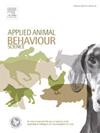犬主照料风格量表(Lincoln owner caregiving Questionnaire, LOCQ)的编制及其与犬类行为问题的关系
IF 2.2
2区 农林科学
Q1 AGRICULTURE, DAIRY & ANIMAL SCIENCE
引用次数: 0
摘要
越来越多的人认识到,狗和主人的关系是一种依恋关系,类似于人类的婴儿看护关系。然而,人们似乎很少认识到,婴儿的依恋类型通常是对父母照顾方式的反应,也就是说,狗主人的照顾方式可能在狗的依恋类型的发展中起着重要作用。因此,我们旨在开发一种可靠的基于主人反应的工具来评估他们对狗的行为,重点关注不同的“父母”照顾方式,这些方式会导致孩子的四种依恋形式(安全型、矛盾型、回避型和无组织型),并比较这些风格与狗的行为问题之间的关系。研究人员在网上发布了一份包含40个项目(李克特7分量表)的调查问卷,根据四种照顾方式,狗主人被要求表明他们对每个项目的认同程度,并报告他们的狗是否有行为问题。共有982名参与者回答了问卷,并进行了主成分分析等验证方法。通过多项广义线性模型,将狗没有行为问题的主人与报告狗有不同行为问题的主人进行比较。结果表明,由矛盾型、回避型和无序型三个照料风格维度组成的新型狗主人照料问卷(Lincoln Owner caregiving questionnaire, LOCQ)具有较好的效度(项目效度、面孔效度和内容效度、收敛效度和判别效度)。此外,研究还发现,在无组织和/或回避型护理风格中得分高的人,可以显著地预测狗的一些问题行为的存在。具体来说,与没有行为问题的狗主人相比,无序照顾风格得分高的主人预测狗会有分离相关问题或不止一种行为问题,回避型照顾风格得分高的主人预测狗会有恐惧,而无序和回避型照顾风格得分高的主人预测狗会有攻击性问题。因此,我们开发了一种基于依恋理论的可靠工具来评估狗主人的照顾方式,并显示其与问题行为的关系。虽然因果关系无法推断,但这些结果在评估和开发狗的行为问题的治疗方法以及改善狗及其主人的福利时具有很高的价值。本文章由计算机程序翻译,如有差异,请以英文原文为准。
Development of a dog owner caregiving style scale (Lincoln Owner Caregiving Questionnaire, LOCQ) and its relationship with behaviour problems in dogs
There is increasing recognition that a dog’s relationship with its owner is a form of attachment bond with similarities to the human infant-carer bond. However, it seems less recognised that infant attachment style is typically a response to parental caregiving style, i.e., the style of caregiving by the dog’s owner may play an important role in the development of the attachment style of a dog. We therefore aimed to develop a reliable owner-response-based instrument to assess behaviour directed towards their dogs, focused on different ‘parental’ caregiving styles which give rise to four forms of attachment in the child (Secure, Ambivalent, Avoidant and Disorganised), and compare the relationship between these styles and behaviour problems in dogs. A questionnaire with 40 items (7-point Likert scale) based on the four styles of caregiving was made available online where dog owners were asked to show how much they agreed with each item and report if their dogs had behaviour problems. A total of 982 participants answered the questionnaire and Principal component analysis and other validation methods were conducted. Owners whose dogs were not reported having any behaviour problem were compared with those who reported different behaviour problems in their dogs by Multinomial Generalised Linear Model. Results showed good validity (item reliability, face and content validity, and convergent and discriminant validity) for the new caregiving questionnaire for dog owners (Lincoln Owner Caregiving Questionnaire, LOCQ) which is composed by three Caregiving style dimensions: Ambivalent, Avoidant and Disorganised. Additionally, it was found that having a high score in the Disorganised and/or Avoidant caregiving styles significantly predicted the presence of some problem behaviours in a dog. Specifically, compared to owners of dogs without behaviour problems, owners with high scores for the Disorganised caregiving style predicted dogs with separation related problems or with more than one behaviour problem, owners with high Avoidant caregiving style scores predicted dogs with Fear, and owners with high scores for both Disorganised and Avoidant caregiving styles predicted dogs with Aggressivity problems. Hence, we have developed a reliable tool for evaluating dog owner caregiving style based on Attachment theory and showed its relationship with problem behaviour. Although causal relationships cannot be inferred, these results will be highly valuable when evaluating and developing treatment for behaviour problems in dogs, and to improve the welfare of dogs and their owners.
求助全文
通过发布文献求助,成功后即可免费获取论文全文。
去求助
来源期刊

Applied Animal Behaviour Science
农林科学-行为科学
CiteScore
4.40
自引率
21.70%
发文量
191
审稿时长
18.1 weeks
期刊介绍:
This journal publishes relevant information on the behaviour of domesticated and utilized animals.
Topics covered include:
-Behaviour of farm, zoo and laboratory animals in relation to animal management and welfare
-Behaviour of companion animals in relation to behavioural problems, for example, in relation to the training of dogs for different purposes, in relation to behavioural problems
-Studies of the behaviour of wild animals when these studies are relevant from an applied perspective, for example in relation to wildlife management, pest management or nature conservation
-Methodological studies within relevant fields
The principal subjects are farm, companion and laboratory animals, including, of course, poultry. The journal also deals with the following animal subjects:
-Those involved in any farming system, e.g. deer, rabbits and fur-bearing animals
-Those in ANY form of confinement, e.g. zoos, safari parks and other forms of display
-Feral animals, and any animal species which impinge on farming operations, e.g. as causes of loss or damage
-Species used for hunting, recreation etc. may also be considered as acceptable subjects in some instances
-Laboratory animals, if the material relates to their behavioural requirements
 求助内容:
求助内容: 应助结果提醒方式:
应助结果提醒方式:


